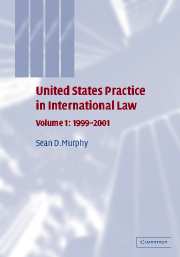Book contents
- Frontmatter
- Contents
- Foreword by Judge Thomas Buergenthal
- Acknowledgments
- Table of Periodical Abbreviations
- Table of Cases
- Table of U.S. Statutes
- Table of Treaties
- I General International and U.S. Foreign Relations Law
- II State Diplomatic and Consular Relations
- III State Jurisdiction and Immunities
- IV State Responsibility and Liability
- V International Organizations
- VI International Law and Nonstate Actors
- VII International Oceans, Environment, Health, and Aviation Law
- VIII International Economic Law
- IX International Human Rights
- X International Criminal Law
- XI Use of Force and Arms Control
- XII Settlement of Disputes
- XIII Private International Law
- Annex
- Index
VII - International Oceans, Environment, Health, and Aviation Law
Published online by Cambridge University Press: 10 December 2009
- Frontmatter
- Contents
- Foreword by Judge Thomas Buergenthal
- Acknowledgments
- Table of Periodical Abbreviations
- Table of Cases
- Table of U.S. Statutes
- Table of Treaties
- I General International and U.S. Foreign Relations Law
- II State Diplomatic and Consular Relations
- III State Jurisdiction and Immunities
- IV State Responsibility and Liability
- V International Organizations
- VI International Law and Nonstate Actors
- VII International Oceans, Environment, Health, and Aviation Law
- VIII International Economic Law
- IX International Human Rights
- X International Criminal Law
- XI Use of Force and Arms Control
- XII Settlement of Disputes
- XIII Private International Law
- Annex
- Index
Summary
OVERVIEW
Throughout 1999–2001, the United States pursued the development of international law in the area of oceans, environment, health, and aviation. With respect to oceans, the United States undertook numerous initiatives to advance its national security, facilitate commerce, manage fish resources, foster scientific understanding, and protect the marine environment through bilateral, regional, and multilateral fora. With respect to the environment, the United States pursued the effective international management of natural resources, such as fresh water and forests, and the effective regulation of transboundary movements of genetically modified organisms and hazardous chemicals. Yet, as was particularly seen in the negotiations on climate change, the United States demonstrated that it would balance its interests in natural resource protection against the economic consequences of such regulation. In the field of global health law, the United States grappled with global efforts to minimize the health threats from tobacco and to provide effective treatment for persons exposed to HIV/AIDS and other infectious diseases. In the field of aviation law, various issues arose concerning the development of rules on the operation of aircraft, the liability of air carriers when accidents occur, and right of state aircraft to operate in international airspace, with the later issue dramatically raised in the context of an aerial incident off the coast of the People's Republic of China.
- Type
- Chapter
- Information
- United States Practice in International Law , pp. 163 - 200Publisher: Cambridge University PressPrint publication year: 2003

